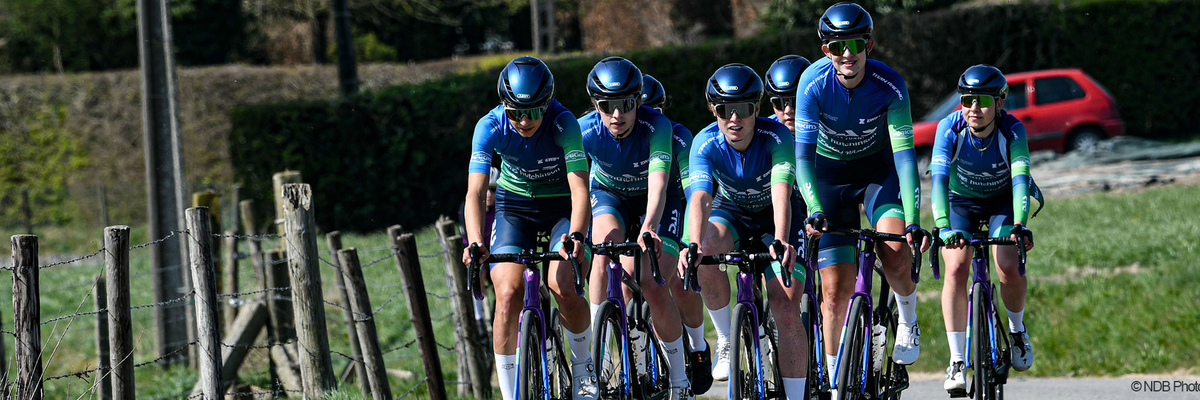

This year, Shoreham Vehicle Auctions has been proud to support one of Britain’s leading UCI Continental women’s cycling teams, DAS-Hutchinson, by supplying a dedicated van to meet the squad’s growing logistical needs. For a team that travels thousands of miles each season - across Britain and Europe - that support has been invaluable.
It has also been a year of milestones. In 2025, DAS-Hutchinson clinched the British Elite Road & Circuit riders’ and teams’ championships, as well as taking its first-ever UCI stage victory in the Czech Republic.
At the Guildford Town Centre Races, we sat down with some of the riders and staff to hear more about the team, the state of women’s cycling, and how support from partners like SVA is helping to make progress possible.
For team manager Simon Howes, who co-founded the team six years ago alongside Andrew Paine, DAS-Hutchinson has always been about creating opportunities.
“We develop riders who can then move on to the WorldTour,” Simon explains. “At our level, that’s a natural role and honestly, it’s what I enjoy most. Some of our riders have achieved incredible success, even Olympic medals. Budget dictates a lot, of course, but for us there’s huge satisfaction in knowing we’ve played a role in their journey.”
That developmental ethos is echoed by the riders themselves. Sophie Lewis, the team’s longest-serving rider, values the flexibility the team has given her as she balances road and track racing.
“They’ve always supported me in splitting my time,” she says. “I’ve raced on the track and even won a European title there, but my main focus is road racing at the moment. Having a team that’s so supportive has made a big difference.”
DAS-Hutchinson riders also compete at the very highest level. Tiffany Keep rode for South Africa at the Paris Olympics while part of the team.
“It was a dream come true,” she says. “Honestly, I didn’t expect it to happen. I only found out I was going in June before the Games, and there was even an appeal process to get through. By the time I got there, my role wasn’t to race for myself, I was there to support my teammates. The experience was unbelievable.”
“The team works in a very similar way too, we don’t just ride for ourselves, we push and support each other and it’s great to be part of a team like that.”
Alice Sharpe, who represented Ireland at the Olympics, also praises the environment at DAS-Hutchinson.
“The team just felt really friendly,” she says. “The year before joining, I was on a WorldTour team and it was tough to balance track and road. Being back in a team that understood my commitments appealed to me. The race calendar suited me better, with more of the traditional British and Belgian races, which I prefer.”
Everyone we spoke to agrees that women’s cycling has come a long way, but also that challenges remain.
“When I started racing back in 2010, women’s cycling wasn’t really a thing,” recalls Sean, one of DAS Hutchinson’s mechanics and logistics leads. “There’d be a handful of women allowed to race with the men. Things changed after the London Olympics and suddenly cycling became mainstream. But the gap between us and the WorldTour has grown. We’ll turn up to races with a van and a car, and the big teams arrive with buses and 20 bikes. We hold our own, but the difference is all down to budget.”
Sophie echoes that sentiment. “At men’s continental level, most riders are paid. In women’s cycling, hardly any of us are. The top end has developed quickly, but at continental level it feels like we’ve been left behind a bit.”
Alice is optimistic though, highlighting the cultural shift that has drawn more people into cycling since COVID. “When I was younger, cycling was seen as a bit odd. Now it’s much more mainstream. We’ve even got a Women’s WorldTour, which didn’t exist when I started. Most of the money is still at the top, but over time that should filter down.”
For Simon, the growth of grassroots participation is another bright spot. “There are loads of women’s-only cycling groups now, and that feeds into the sport. Sometimes those riders are company directors, and suddenly they want to sponsor a team. It all adds up.”
That’s where backers like SVA come in. “Without proper support, teams can’t race, can’t develop, can’t grow,” says Simon. “The help we get from sponsors, whether it’s financial, equipment, or in this case a vehicle from SVA, is what makes everything possible.”
For SVA, supporting DAS-Hutchinson is about recognising the value of women’s cycling, celebrating the success of a team that consistently punches above its weight, and playing a small but important role in the sport’s future.